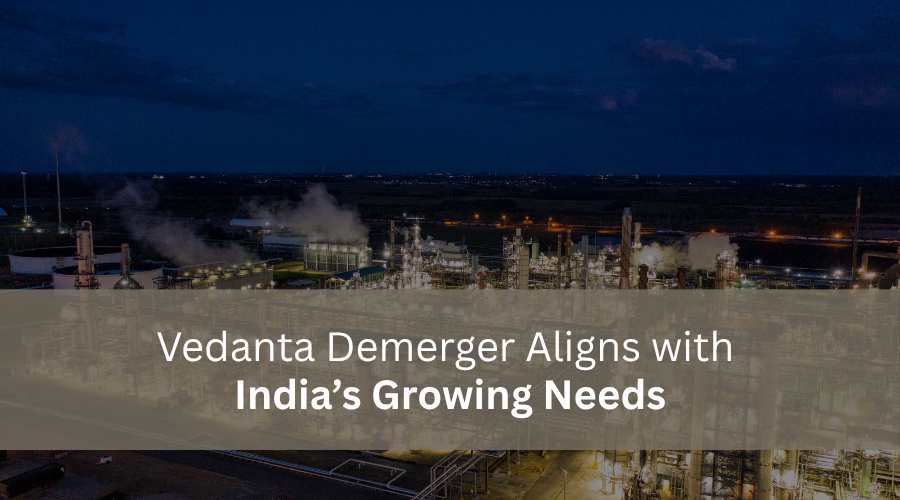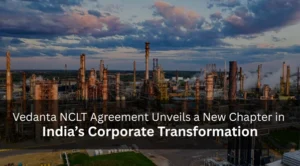Vedanta Demerger Aligns with India’s Growing Needs
India’s energy journey is witnessing a huge transformation – with an increase in oil production to meet future energy demand. In this context, Anil Agarwal, Chairman of Vedanta Limited, sent a clear message: “We must produce more oil in India.” He supported his statement, claiming that India’s oil demand is expected to double by 2050, and urged reforms such as self-certification of clearances to accelerate exploration and production.
Vedanta, one of the leading natural resources companies, has already announced its plans to demerge to build sharper, stronger, and more sustainable businesses that will continue to power India’s growth story. According to the Vedanta demerger scheme, the company will split into five pure-play companies, including Vedanta Limited, Vedanta Aluminium, Vedanta Oil & Gas, Vedanta Power, and Vedanta Iron and Steel. By creating a standalone oil & gas vertical, Vedanta is aligning with India’s vision of energy security needs, which will grow phenomenally in the coming years.
Increase in India’s Oil Demand
According to BP’s Energy Outlook 2025, the country’s oil demand is expected to be 9 million barrels per day in 2050, which means it will almost double from the current demand of around 5 million barrels per day. Anil Agarwal stated that today India produces only 0.6 million barrels per day, meeting just a fraction of total demand.
India’s growing reliance on imported oil has long been a pressure point economically and geopolitically. Agarwal’s emphasis on increasing domestic oil production which will help meet energy demand and reduce the import burden. Also, Agarwal’s vision aligns seamlessly with India’s vision to become Atmanirbhar Bharat” (self-reliant India).
Vedanta’s ambition here aligns well with national priorities — as India seeks to achieve cleaner, more sustainable growth, it also needs stable access to energy. By positioning itself as a proactive player in oil and gas, the company, through the Vedanta Demerger Scheme, is reinforcing its identity as more than a metals or mining house — it’s shaping up to be a diversified energy & resources company.
BP’s Outlook on India’s Energy Future
BP’s outlook on India’s energy future reveals that though renewables, particularly solar and wind, will see strong growth, coal will also remain a significant part of India’s energy mix, with its share expected to stay above 40% in India’s energy mix by 2050.
On the other side, the oil demand will continue to surge, with India expected to account for 10% of global consumption by 2050, up from 5% in 2023, according to BP’s chief economist Spencer Dole.
To meet this demand, India needs to strike a delicate balance between sustainability and self-reliance. Even India has witnessed a renewed surge in oil and gas exploration, particularly in offshore regions, underscoring the country’s vast untapped hydrocarbon potential. The government’s recent announcement to launch the National Deep Water Exploration Mission to explore the reserves of oil and gas beneath the sea reflects the country’s growing focus on exploring untapped offshore resources.
How the Demerger Strategy Amplifies Vedanta’s Energy Vision?
Vedanta’s demerger — the plan to split its various business verticals into independent entities (aluminium, power, oil & gas, etc.) is not only a corporate restructuring. It’s a structural move that supports exactly this kind of long-term sectoral focus. By creating oil & gas- a separate business entity, Vedanta creates clarity, focus, and accountability. The new business entity will take charge of Vedanta’s Oil and Gas business, which is India’s largest private oil, gas and sweet crude exploration and production company.
While talking about fast-tracking exploration and clearances, Anil Agarwal stated that it becomes easier for a standalone oil & gas business to engage directly with regulators, ministries, and local stakeholders. That agility is one reason why the Vedanta demerger scheme highlights structured growth and responsible transformation.
Conclusion
When Vedanta’s chairman calls for India to produce more oil, it’s more than just a statement— it reflects how Vedanta sees its next chapter. The plan to demerge its businesses gives the company a structural advantage—clearer focus, streamlined decision-making, and the ability to grow with credibility.
This alignment between India’s energy security aspirations and Vedanta’s strategic restructuring sets the stage for credible transformation. The deployment of the Vedanta demerger scheme will not just help India achieve energy independence but will help it emerge as a global superpower.













